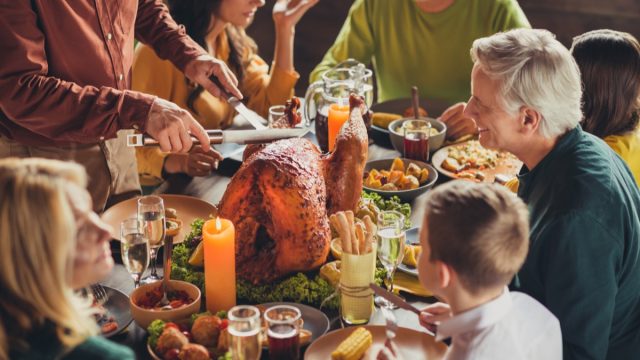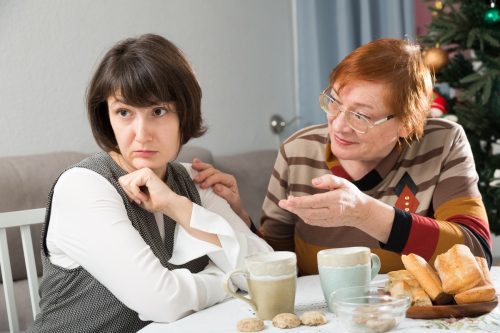Look for These 5 Body Language Signs to Avoid a Family Fight, Therapists Say
These could be clear indicators that trouble is brewing amid holiday gatherings.

Many of us are gearing up to gather with our families in the coming weeks. And while it's nice to spend time with our loved ones, the holidays can also bring a fair share of tension to the dinner table. After all, stress can build up for several reasons during the season—whether it be because of travel troubles, hosting pressures, or even financial frustrations—and eventually, it may all boil up to the surface. But you don't have to live your holidays in fear that a family fight is going to break out at any moment. Instead, you can pay attention to what people may not be saying so you can diffuse difficult feelings before they overflow. Read on to find out what experts say are the body language signs you should look for to help avoid a family fight.
READ THIS NEXT: 5 Body Language Signs That Mean Someone Is Lying, According to Therapists and Lawyers.
1
Turned body direction

Most people face someone who is talking if they are actually engaged and interested in the conversation at hand. Due to this, you should pay close attention to the direction of people's bodies when at a family gathering, says Boone Christianson, LMFT, a licensed marriage and family therapist based in Provo, Utah, and author of 101 Therapy Talks.
According to Christianson, the main thing to look for is where someone's feet and torso are directed during a conversation. "If they are directed away from you, it may mean they are feeling discomfort or lack of interest in the interaction," he explains.
2
Lack of eye contact

But someone doesn't have to turn their entire body away from you to indicate that they would like to distance themselves from a certain conversation. Instead, they might avoid eye contact with you, according to Heather Wilson, LCSW, a certified trauma professional who works in the behavioral healthcare industry and serves as the executive director at Epiphany Wellness.
"This could mean that the person is feeling shy or anxious about being part of the conversation, and so they are avoiding it altogether by not making direct eye contact," she explains. "It might also indicate that they are uncomfortable with what is being talked about or with certain people in the room."
READ THIS NEXT: 5 Body Language Signs You Should Never Ignore From Your Partner, Therapists Say.
3
Clenched fists

This might be one of the more obvious body language signs of trouble, but it doesn't make it any less important to watch out for. Wilson says that someone is likely to clench their fists when they're anxious, stressed, or even preparing themselves for an upcoming confrontation.
"Pay close attention to the person's facial expressions and body language while they clench their fists as it may give clues into what emotions they are experiencing," she advises. "If you see [this], it is best to approach the person with care and understanding. Showing compassion and actively listening can go a long way in creating a safe and comfortable environment."
4
Crossed arms

It can be hard for people to set healthy boundaries through clear communication with their family, according to clinical psychologist Rayna Sanghvi, PhD. "This could be for many reasons; in some cultures expressing yourself may be seen as 'weak' or stigmatized," she says. "Or, folks have histories of invalidating interactions where they don't feel safe to express themselves."
As a result, many of us end up using some common non-verbal signals—like crossing our arms—to express ourselves during family conversations. Crossed arms usually indicate "distance and emotional discomfort," Sanghvi explains. Heather Browne, LMFT, a psychotherapist and relationship expert, tells Best Life it's important that we are responsive to what our family seems open and not open to discussing.
"Many families treat the individuals under an obligation mode where you must listen to Aunt Helen because she's Aunt Helen," Browne explains. But that's not good practice. Instead, she advises you to pay attention when someone crosses their arms during a conversation: "You can always say, 'Would you like to talk more about this or would you prefer to stop? I want to be respectful.'"
For more family advice delivered straight to your inbox, sign up for our daily newsletter.
5
Facial tension

Someone's face can easily give them away—especially if there's tension at play. "Most facial muscle flexions that are sudden and short indicate some discomfort that could be anger, fear, frustration, or restraint," Christianson explains. According to the therapist, people's faces usually become tense when they're trying to suppress any of these negative emotions. "The holidays are often a time to walk on eggshells with people we know would not handle our feelings very well," he says.





















